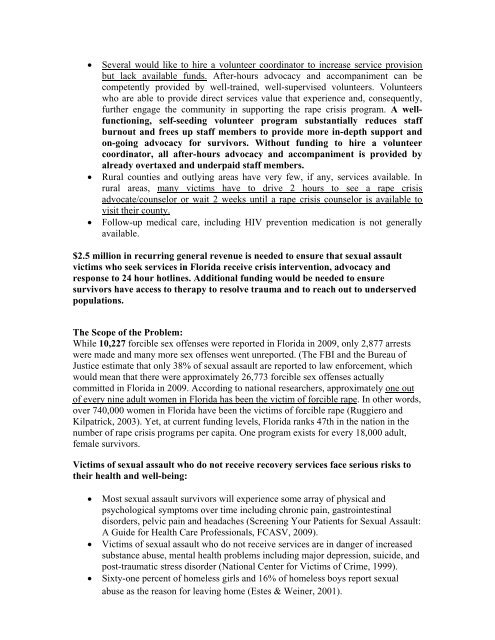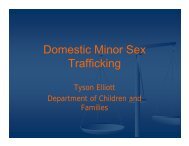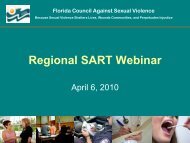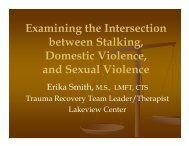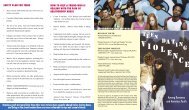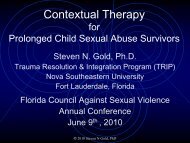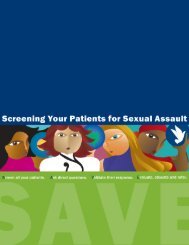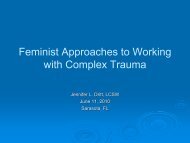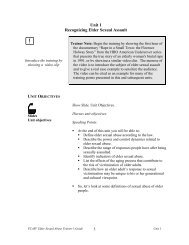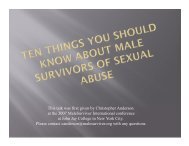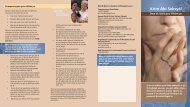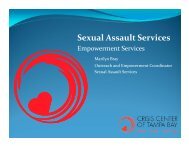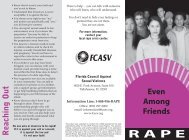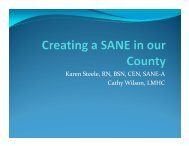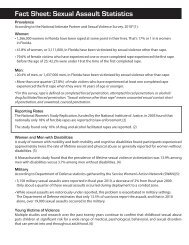funding briefing - Florida Council Against Sexual Violence
funding briefing - Florida Council Against Sexual Violence
funding briefing - Florida Council Against Sexual Violence
You also want an ePaper? Increase the reach of your titles
YUMPU automatically turns print PDFs into web optimized ePapers that Google loves.
Several would like to hire a volunteer coordinator to increase service provision<br />
but lack available funds. After-hours advocacy and accompaniment can be<br />
competently provided by well-trained, well-supervised volunteers. Volunteers<br />
who are able to provide direct services value that experience and, consequently,<br />
further engage the community in supporting the rape crisis program. A wellfunctioning,<br />
self-seeding volunteer program substantially reduces staff<br />
burnout and frees up staff members to provide more in-depth support and<br />
on-going advocacy for survivors. Without <strong>funding</strong> to hire a volunteer<br />
coordinator, all after-hours advocacy and accompaniment is provided by<br />
already overtaxed and underpaid staff members.<br />
Rural counties and outlying areas have very few, if any, services available. In<br />
rural areas, many victims have to drive 2 hours to see a rape crisis<br />
advocate/counselor or wait 2 weeks until a rape crisis counselor is available to<br />
visit their county.<br />
Follow-up medical care, including HIV prevention medication is not generally<br />
available.<br />
$2.5 million in recurring general revenue is needed to ensure that sexual assault<br />
victims who seek services in <strong>Florida</strong> receive crisis intervention, advocacy and<br />
response to 24 hour hotlines. Additional <strong>funding</strong> would be needed to ensure<br />
survivors have access to therapy to resolve trauma and to reach out to underserved<br />
populations.<br />
The Scope of the Problem:<br />
While 10,227 forcible sex offenses were reported in <strong>Florida</strong> in 2009, only 2,877 arrests<br />
were made and many more sex offenses went unreported. (The FBI and the Bureau of<br />
Justice estimate that only 38% of sexual assault are reported to law enforcement, which<br />
would mean that there were approximately 26,773 forcible sex offenses actually<br />
committed in <strong>Florida</strong> in 2009. According to national researchers, approximately one out<br />
of every nine adult women in <strong>Florida</strong> has been the victim of forcible rape. In other words,<br />
over 740,000 women in <strong>Florida</strong> have been the victims of forcible rape (Ruggiero and<br />
Kilpatrick, 2003). Yet, at current <strong>funding</strong> levels, <strong>Florida</strong> ranks 47th in the nation in the<br />
number of rape crisis programs per capita. One program exists for every 18,000 adult,<br />
female survivors.<br />
Victims of sexual assault who do not receive recovery services face serious risks to<br />
their health and well-being:<br />
<br />
<br />
<br />
Most sexual assault survivors will experience some array of physical and<br />
psychological symptoms over time including chronic pain, gastrointestinal<br />
disorders, pelvic pain and headaches (Screening Your Patients for <strong>Sexual</strong> Assault:<br />
A Guide for Health Care Professionals, FCASV, 2009).<br />
Victims of sexual assault who do not receive services are in danger of increased<br />
substance abuse, mental health problems including major depression, suicide, and<br />
post-traumatic stress disorder (National Center for Victims of Crime, 1999).<br />
Sixty-one percent of homeless girls and 16% of homeless boys report sexual<br />
abuse as the reason for leaving home (Estes & Weiner, 2001).


